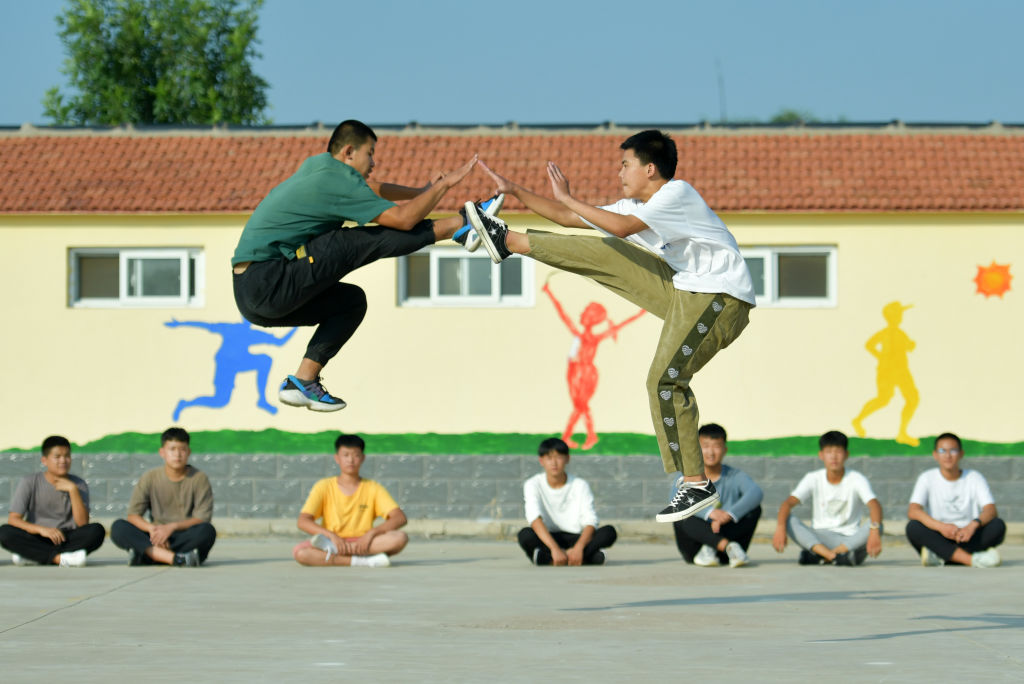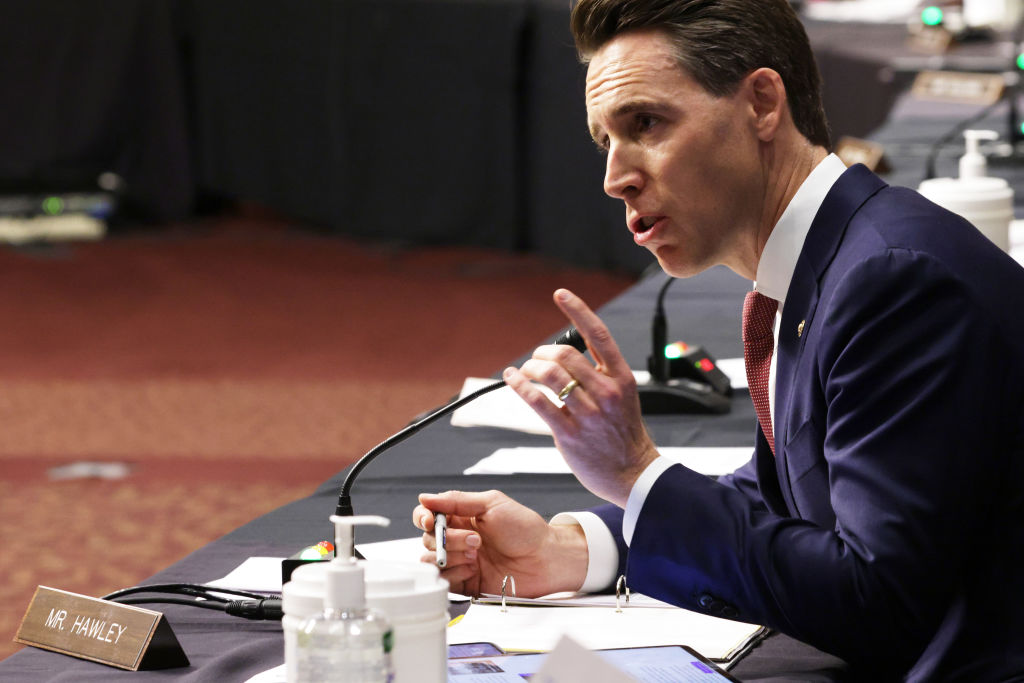Traditional conservatives could use a fresh rhetoric of masculinity.
Making Men

The U.S. should follow China's lead in promoting masculinity in schools.
Last year, China’s Education Ministry published plans to “cultivate masculinity” in the schools. This curriculum will be implemented across the board, from kindergarten all the way through high school. The announcement came shortly after a senior official in China declared that the country was going through a “masculinity crisis.” One official, according to NBC, said Chinese boys had been “spoiled by housewives and female teachers.” They were fast becoming “delicate, timid and effeminate.” The “feminization” of Chinese boys, announced the official, threatened “China’s survival and development.” In China, unlike the U.S., kids are not allowed to skip gym class. To create a new generation of men fit for purpose, students are required to engage in two hours of physical activity every day, one hour during school, one hour after. China’s ruler, Xi Jinping, is directly behind the push.
Meanwhile, in the U.S., as I have discussed before, a crisis of masculinity is also evident. If the U.S. was to take a leaf out of China’s book and teach masculinity in schools, what would such a curriculum look like?
Richard Cooper, the bestselling author of The Unplugged Alpha, thinks this question is “a bit of a stretch,” because “the West doesn’t want strong boys, and men.” He continued, “just look at how they teach them in an academic setting. The school system is actively making men weaker, and softer. Only countries like China have active academic settings to masculinize boys to men. This is something parents need to do themselves. Fathers need to lead by example. “
This suggestion about fathers resuming their traditional role in American society is not new. But considering the United States has the highest rate of single-parent households in the world, and the vast majority of these households are headed by women, Cooper’s demand for fathers to “lead by example,” although a great idea, won’t save the boys of today and the men of tomorrow.
The education system, as Cooper points out, is fundamentally broken. It views masculinity as “toxic,” something to be criticized, even eradicated, not something to be saved. This is true across society in general. Cooper noted that, today, “masculinity is hated, shamed and vilified today to a degree never seen before in history, that is until a war, or natural disaster occurs, then all the women, children, and weak men run for safety, while virtuous men run into danger. ‘They’ say ‘toxic masculinity’ is the problem, the truth is, a lack of masculinity is the problem.”
Ideally, an educator will start a school, or even an after-school program, dedicated to preserving masculine ideals. This call may be naïve, but perhaps a billionaire philanthropist with a conscience will answer it. If someone wants to save America, how about starting with saving the boys? Men are disposable, but it needn’t be this way.
The ideal model would be a Stoic school, with a heavy emphasis on history, philosophy (obviously), strategic thinking, and logic. Marcus Aurelius, perhaps the most famous of the Stoics, was many things: a father, an emperor, and a philosopher. Among his many masculine qualities, he had tremendous resilience. As Arash Emamzadeh recently noted, “what differentiates successful from unsuccessful people is not whether they have ever experienced a failure. The differentiating factor is, instead, how they have responded—e.g., with greater determination and a renewed commitment to the goal vs. losing hope and giving up.” If there was ever a time to promote the concept of antifragility, it’s now.
A legitimate college dedicated to teaching and practice of Stoic philosophy already exists. According to its website, the College of Stoic Philosophers, “was founded in 2008 and remains the only institution worldwide focused on the theory and practice of traditional Stoic philosophy.” The school’s curriculum “attempts to re-create a Stoic education program as it was practiced in ancient Greece and Rome – with an equal emphasis on Logic, Physics, and Ethics.” Considering that physics education in the U.S. is currently in crisis, the College of Stoic Philosophers appears to be onto something. Moreover, in this age of doublespeak, where lies masquerade as truth, a heavy emphasis on logic and ethics seems appropriate.
Creating Stronger Men
One in every two hundred men alive today is a relative of Genghis Khan, a fearless warrior who slayed and conquered with impunity. Look around the U.S., though, and you’ll struggle to find many warriors. Instead, you’re far more likely to find morbidly obese slobs, stuffing their faces with processed foods. A school dedicated to the promotion of masculinity would need to focus on physical education, nutrition and self-defense classes. Jiu-Jitsu, for example, has been shown to promote self-esteem in young men. Not only does an individual learn to defend himself, he learns to pick himself up, both literally and figuratively, after a hard knock. The crisis of self-esteem among young men appears to be getting worse, and drug overdose deaths—mostly of men—now top 100,000 annually.
Financial literacy must also be addressed. Math and economics classes are great, but they do very little, if anything, to teach students how to manage money properly. Another type of literacy, namely digital literacy, should also be taught. This involves having the ability to navigate various digital platforms, as well as possessing the knowledge to differentiate between real news and fake news (a tough task today, I know). Such a class would impart young men with skills that so many people, not just young people, lack.
The literacy classes would tie in with basic life skills classes. Boys would be taught how to change a tire, tie a tie, change a lightbulb (more than 80 percent of Millennials don’t know how to), and boil an egg (plenty don’t know how to do that either). Classes dedicated to critical thinking and effective communication would also need to be offered. Instead of promoting critical thinking, the current education system suppresses it. In this age of online learning and digital, rather than physical, interactions, we are at risk of becoming ineffective communicators. To function as a man, and as a human being, communicating via emojis is not, contrary to popular belief, a successful means of interlocution. Moreover, impulse control and decision making skills must be inculcated into young men. Although impulse is not always a bad thing, and acting with your gut carries some benefits, the importance of cool, calm thinking cannot be over-emphasized enough. Restraint is a virtue, and learning how to govern one’s impulses is essential for learning skills, saving money, raising a family, and success in life generally.
Men need a tribe; the same is true for boys. In the U.S., the Boy Scouts used to offer a place for young men to learn valuable skills. But in 2019 the Boy Scouts started accepting girls. It is of prime importance that boys have a space to interact solely with other boys, even if it’s just for a few hours each week.
Rollo Tomassi, the bestselling author of the Rational Male series, told me that America’s young men need to be taught that Masculinity is not toxic. “For over 60 years,” he said, “we’ve socially engineered four generations of men to either loathe their masculinity or question its authenticity in defining men’s’ identities.”
Tomassi continued, “from boys to men, we’re taught to hate our masculinity or be confused with it by defining masculinity through relativism, subjectivism, and emotionalism – all uniquely feminine-correct ways of experiencing ourselves.” He believes that the only way “to counter this confusion is to objectively define masculinity as a concrete set of conventionally masculine traits, attributes, and characteristics.”
He warned that “the language and ideologies of emotionalism, social constructionism, and subjectivism are the enemies of masculinity. Unapologetic rational empiricism,” rather than emotionally-charged narrative, “is the only way strong men will proceed from hard times.”
Finally, Tomassi says that young men need to realize that responsibility without authority is akin to “slavery.” He expanded on this point: “We fool ourselves in hoping that a message of responsibility and ‘radical self-ownership’ will engender masculine qualities in men.” That garbage “may sell books,” he said, “but without a commensurate masculine authority” it does very little to create “strong men in hard times.”
Tomassi referenced Pastor Mark Driscoll, a man who “once claimed that men were like big-rig tractor-trailers—they drive straighter with a full load of responsibility in the trailer. This bonehead metaphor,” according to the podcaster and gatekeeper of the Manosphere, “presumes the guy driving the truck has the authority to be driving it. Today, men have been utterly disenfranchised from masculine authority. Calls for responsibility as some cure for a return to idealized masculinity are baseless if there is no presumption of assuming the authority necessary to be responsible in the first place. There is no incentive for men to be responsible if there is no authority in the trade.”
Tomassi does not say that men should be given unquestioned, unaccountable control of women and the world. Men should take responsibility, but only if the juice, as they say, is worth the squeeze. Strong men make good decisions, and they weigh up the pros of a situation versus the cons. Authority—or more specifically, autonomy and self-ownership—is something that must be celebrated, not condemned.
This is a message that young men across the country need to hear. Now is the time to get this message across.
The American Mind presents a range of perspectives. Views are writers’ own and do not necessarily represent those of The Claremont Institute.
The American Mind is a publication of the Claremont Institute, a non-profit 501(c)(3) organization, dedicated to restoring the principles of the American Founding to their rightful, preeminent authority in our national life. Interested in supporting our work? Gifts to the Claremont Institute are tax-deductible.
How to cultivate masculinity in a culture that despises it.
Senator Josh Hawley has struck a powerful rhetorical blow against woke communism.



